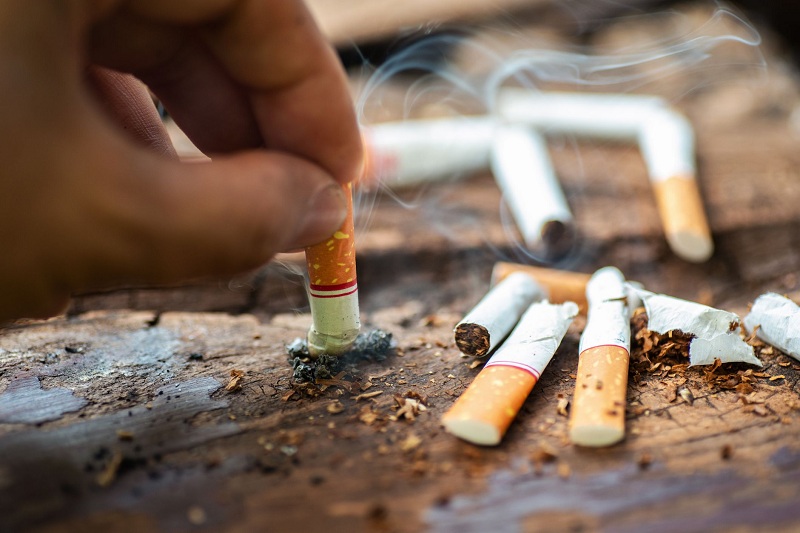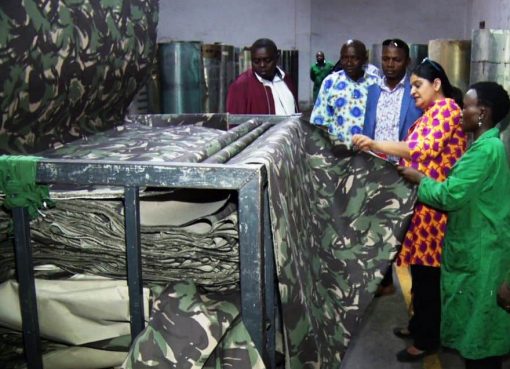The government ratified the Protocol to Eliminate Illicit Trade in Tobacco Products on 4th May 2020, aimed at combating impact of illegal trade in Tobacco on Public Health, Economic and social well-being.
Health Cabinet Secretary Mutahi Kagwe said tobacco is a major risk factor to Non-Communicable Diseases like cardiovascular, cancer, respiratory and diabetes conditions that are more vulnerable to severe COVID-19.
As the country commemorated the worlds NO Tobacco Day Monday, Kagwe added that tobacco smoking predisposes smokers to severe form of Covid-19 not to mention the possible transmission during the process of smoking, where tobacco users share the cigarettes and other products.
The theme of this year’s World No Tobacco Day is Commit to Quit, and this the CS said will help create healthier environments that are conducive to quitting tobacco by advocating for strong tobacco cessation policies, increasing access to cessation services, raising awareness of tobacco industry tactics and empowering tobacco users to make a successful quit attempts through Quit and Win initiatives.
“To create an environment conducive to quitting tobacco, we are working very closely with other ministries, department agencies and counties to implement tobacco control measures that effectively reduce the demand and supply of tobacco,” added Kagwe.
He said that the government together with other partners has created strong digital platforms where Kenyans can find information and social support they need to quit.
“I call upon all Kenyans, especially young people to join the fight to become a tobacco-free generation now and in future. I call on all tobacco users to quit and you may call the 1192 toll-free number for help or visit your nearest health facility,” he reiterated.
The Ministry, Kagwe added has also partnered with World Health Organization (WHO) and National Campaign for Alcohol and Drug Abuse (NACADA) to ensure that callers have access to brief advice, toll-free quit lines, mobile and digital cessation services, nicotine replacement therapies and other tools that are proven to help people quit.
The CS has however warned of new and emerging products that have been manufactured and traded with an attempt to subvert the law by claiming they are either non-tobacco or non-nicotine despite tobacco advertising, promotion and sponsorship having been banned in Kenya.
“I want to point out that products that mimic tobacco products are also regulated and therefore call on the County Governments and customs department to ensure that all enforcement officers confiscate such products and take the necessary action against those that are found culpable,” Kagwe said in his statement.
The CS has assured Kenyans that the Government, through the Ministry of Health will do all that it takes with systematic, aggressive and sustained control of sale and marketing of tobacco, including nicotine products to protect the current and future generations of this Country, hence calling upon all Kenyans to join the Government in these efforts.
Kenya Tobacco Control Alliance (KETCA) has also called upon the government to act fast as tobacco use is a bigger epidemic than Covid -19.
“We are marking this day on a sad note because tobacco use continues to kill at least 9,000 Kenyans every year. This is three times the total number of Kenyans killed by Covid-19 in the last one year. By Sunday, May 30, 2021, Covid-19 had killed 3,157 Kenyans,” said Joel Gitali, chairman of the KETCA.
The Alliance is requesting the Ministry of Health to tighten and fully implement tobacco control regulations in Kenya.
According to WHO Director-General Dr. Tedros Adhanom Ghebreyesus, Smokers have up to a 50 per cent higher risk of developing severe disease and death from COVID-19.
According to the 2015 Kenya STEPS Survey of non-communicable disease, at least 2.5 million adults use tobacco products in Kenya, which constitutes11.6 per cent of the population.
Tobacco damages the lung tissue and according to the government the new and emerging products that have been manufactured and traded illegally include nicotine pouches, e-cigarettes and Heat-not-burn tobacco and nicotine products.
By Catherine Muindi





